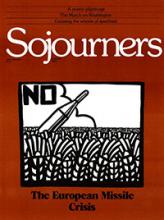"After a few generations of it, people get used to poverty." The stranger on the plane had just put the finishing touch on a conversation we were having about U.S. military aid to El Salvador. This was his crowning argument for helping the brutal Salvadoran military maintain the status quo in the embattled Central American nation.
His words came back to haunt me my first night in the D.C. jail following our Peace Pentecost witness at the Capitol in May. I was unable to sleep that night, a woman in the cell below punctuating her moans of despair with a regular banging of her cell bars. Through the night I pictured her, hands clenched around the bars, moving back and forth with all her might in a plea of desperation.
"She'll be handcuffed to her bed tonight," a guard told me after I expressed concern for the woman the next morning. "She really doesn't belong here, but the mental hospital is more overcrowded than we are—she's lucky she's not just wandering the streets like most of them."
Later that morning the guard moved us—a group known to our fellow prisoners as simply "the protesters"—out of our intake cell and into the cellblock's gym area, which in these days of overcrowding has been converted into a sleeping area with 16 beds. The inmates who talked toughest during the day were the first ones over on our bunks that night wanting to share about their families, about the children they missed so, about their hopes. Most were serving time for prostitution, and, in many cases, drug charges.
Read the Full Article

